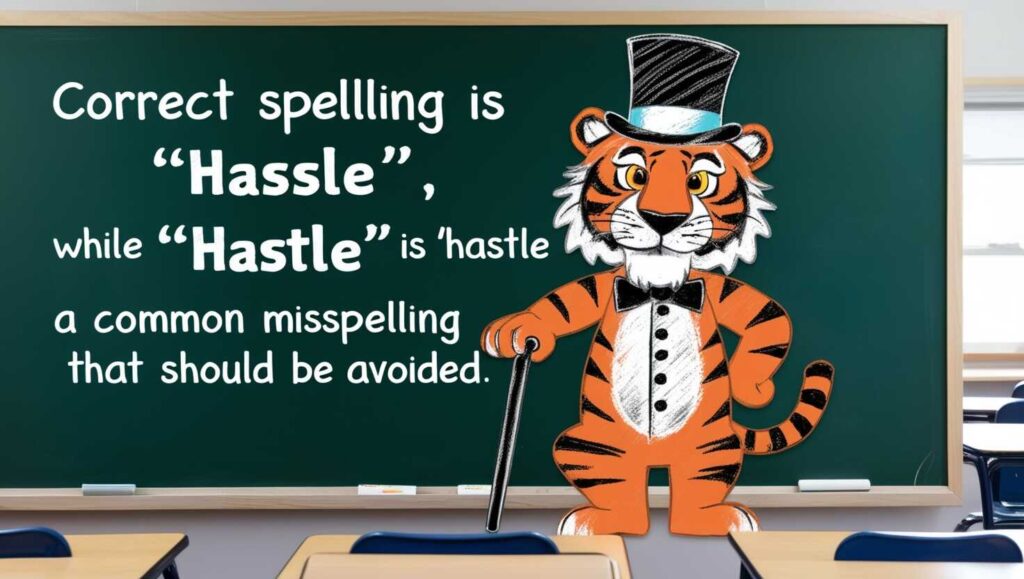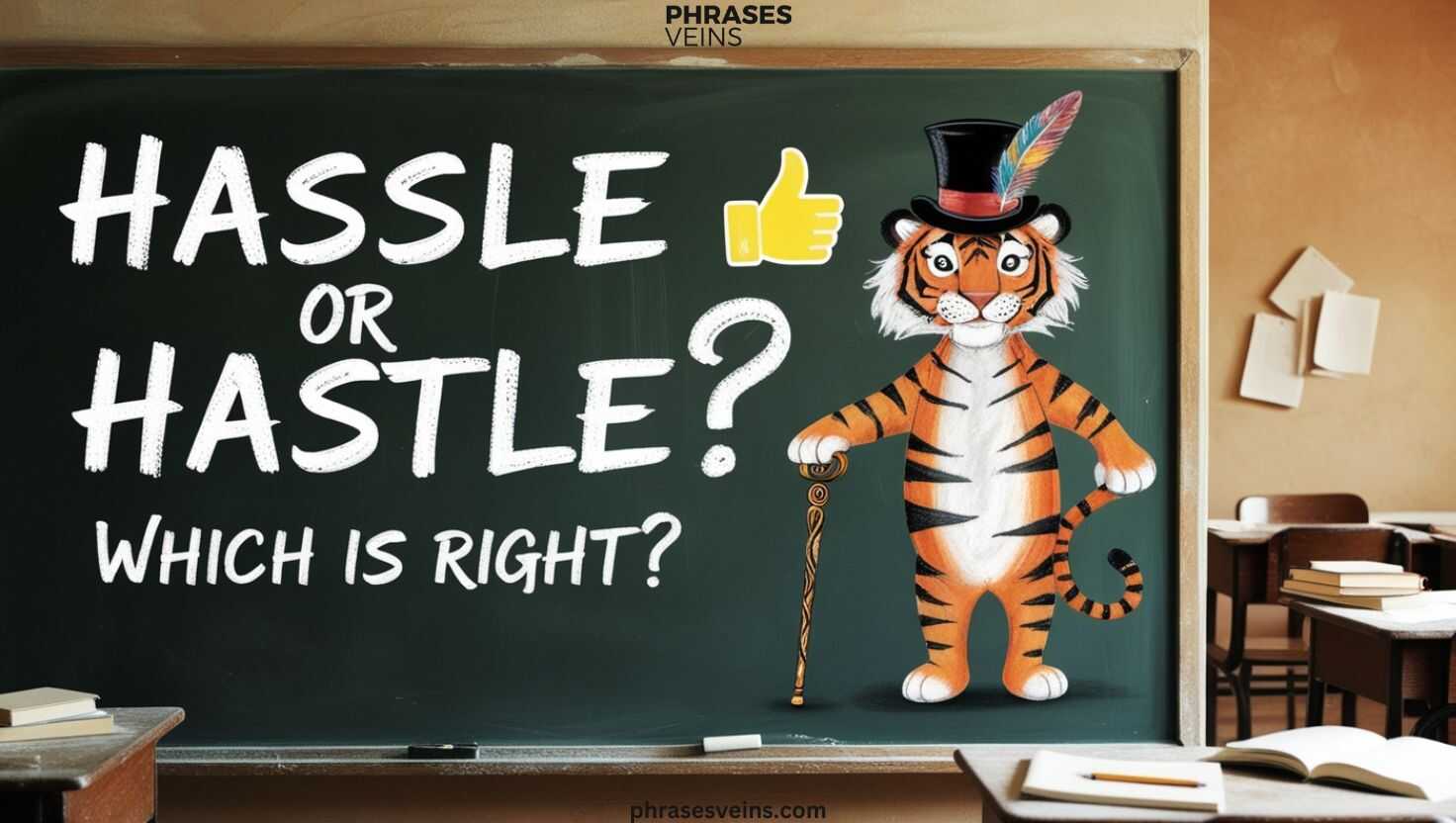When it comes to choosing between hassle or hastle, the correct spelling is “hassle.” The word “hastle” is a common misspelling that doesn’t hold any meaning in the English language. Many people face spelling challenges because the two words sound similar. However, understanding the proper spelling and usage of “hassle” is important for clear communication.
This article dives into the definition of hassle, its history, and its many uses. We’ll also explore why people confuse the two spellings, provide hassle examples, and share tips to avoid the common mistake of writing “hastle.” By the end of this article, you’ll have a strong grasp of using hassle in everyday language.
Correct Spelling Is “Hassle,” While “Hastle” Is a Common Misspelling That Should Be Avoided

The correct spelling of the word is “hassle.” It’s often used to describe trouble or inconvenience in different situations. For example:
- “The long line at the airport was such a hassle.”
- “Dealing with customer service can be a hassle.”
The word “hastle”, on the other hand, is simply a spelling error. This common misspelling arises because of the phonetic similarity between the two. However, it’s essential to stick to the accurate spelling to avoid confusion.
Hastle vs Hassle Quick Difference
To clarify the distinction, here’s a simple table:
| Word | Correctness | Meaning | Usage |
|---|---|---|---|
| Hassle | ✅ Correct | Annoyance or difficulty | Common in English |
| Hastle | ❌ Incorrect | No meaning, a misspelling | Never used properly |
If you want to avoid spelling mistakes, remember that “hassle” has two “s’s”—this is the key to the right spelling.
The Definition of Hassle in Different Contexts
The word “hassle” can function as both a noun and a verb, each carrying its own meaning. Let’s look at the hassle definition in detail.
As a Verb: The Act of Hassling
When used as a verb, “hassle” means to bother, pressure, or annoy someone persistently. It’s often used to describe an action where someone feels harassed or troubled. For example:
- “Stop hassling me about the meeting!”
- “The salesperson kept hassling me to buy the product.”
This verb usage emphasizes a sense of annoyance or disturbance caused by someone else’s actions.
As a Noun: The Concept of a Hassle
As a noun, “hassle” refers to a situation that causes trouble, difficulty, or inconvenience. It can also describe a minor annoyance in everyday life. For instance:
- “Finding parking downtown is always a hassle.”
- “Traveling with kids can be a real hassle.”
Both noun meanings and verb usage highlight the trouble or inconvenience that the word conveys.
Common Usage of the Word ‘Hassle’ in Sentences
The word “hassle” is widely used in English to describe various daily struggles. Here are a few examples to illustrate hassle usage:
- “Returning the item without a receipt was such a hassle.”
- “It’s easier to book tickets online and avoid the hassle of waiting in line.”
- “Let’s plan ahead to make this trip hassle-free.”
From dealing with customer service to navigating crowded streets, everyday hassles are a part of life. Knowing how to apply “hassle” correctly can make your communication clearer and more effective.
READ MORE >>> 30+ Idioms for Mother: Celebrate Maternal Bonds
Etymology: Tracing the Origin of ‘Hassle’
The etymology of hassle reveals its origins in American English, emerging in the early 20th century. The word likely evolved from the term “hustle,” which means to push or move quickly. Over time, “hassle” came to represent stressful or troublesome situations.
The word history of “hassle” shows how it became popular in casual conversations. Its roots in informal language make it perfect for describing routine challenges or minor annoyances in daily life.
Common Meanings and Usage
The word “hassle” has several meanings, all centered around difficulty or frustration. Here’s a detailed breakdown:
| Meaning | Example Sentence |
| Annoyance | “The broken elevator was a hassle for everyone.” |
| Troublesome task | “Filing taxes can be such a hassle.” |
| Persistent bothering | “The kids kept hassling me for ice cream.” |
Understanding these nuances will help you avoid misinterpretation and ensure you’re using the term correctly.
Why the Confusion? Exploring the Spelling Challenges with ‘Hassle’
The confusion between hassle or hastle comes from their phonetic similarity. Many people spell the word as “hastle” because they rely on how it sounds. This common mistake highlights the importance of focusing on spelling rules.
To prevent these spelling issues, remember the double “s” in “hassle.” Phonetics can often be misleading, but consistent practice can help you master the accurate spelling.
Tips to Remember the Correct Spelling: ‘Hassle’
If you often struggle with spelling the word, here are some tips to remember the correct form:
- Think of “hassle” as a “hustle” with double “s.”
- Use a mnemonic: “Hassle always has double trouble with two s’s.”
- Practice using it in sentences until it feels natural.
By following these tricks, you’ll avoid the common misspelling of “hastle.”
‘Hassle’ in Popular Culture and Examples
The word “hassle” has made its way into movies, songs, and TV shows. Here are a few popular culture examples:
- In movies, characters often say lines like, “This isn’t worth the hassle.”
- TV shows frequently depict everyday struggles as “hassles.” For example, in sitcoms, commuting or dealing with neighbors is often called a hassle.
Using ‘Hassle’ in Literature
The term also appears in literature to describe annoying situations. Writers use it to depict moments of difficulty or stress, making their work relatable to readers. For instance:
- “Life’s little hassles often teach us patience.”
Real-life Examples: When ‘Hassle’ Becomes Tumultuous
In real life, “hassle” is often used to describe frustrating situations. Here are a few case studies:
- Airport Delays: Missing a flight due to delays can be a major hassle. Passengers often face long waits, paperwork, and stress.
- Customer Service: Resolving billing errors can feel like a hassle, especially when dealing with unhelpful representatives.
- Daily Commutes: Traffic jams and detours are common hassles that test patience.
These real-life examples show how “hassle” perfectly captures moments of difficulty and annoyance.
Frequently Asked Questions
What does Hastle mean?
Hastle is a common misspelling of the word hassle. It doesn’t hold any meaning in English and is considered an error. The correct spelling is hassle, which means a trouble or inconvenience.
Is it Hassel or Hassle?
The correct spelling is hassle, not hassel. Hassel is another common misspelling often caused by spelling challenges or confusion. Always use hassle when referring to a problem, difficulty, or a minor annoyance.
What does Hassle-Free mean?
Hassle-free means something that is easy, stress-free, or without any trouble or inconvenience. For example, “They offer a hassle-free return policy,” refers to a smooth and problem-free experience.
Is it a Hassle or an Hassle?
The correct usage is a hassle, not an hassle. Since the word hassle begins with a consonant sound (h), the article “a” is used instead of “an.” For example, “It’s a hassle to find parking downtown.”
Conclusion
In the debate of hassle or hastle, the correct spelling is always “hassle.” The word is versatile, used as both a noun and a verb, and describes moments of trouble or inconvenience in everyday life. By understanding the hassle definition, its etymology, and proper usage, you can avoid the common misspelling of “hastle.”
Whether describing daily struggles or referencing hassle-free solutions, this word remains a cornerstone of casual English. Master its spelling and use it confidently in your writing to communicate with ease.

Welcome to PhrasesVeins, where Arabella Reed brings language to life. With a passion for grammar and phrases, Arabella offers unique insights to help you master language and enhance your expression. Whether you’re a language enthusiast or looking to improve your skills, Arabella’s work guides you through the beauty of words.

